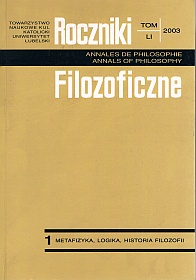Reasonability and Philosophy
Abstract
The article is concerned with the question of rationalism and irrationalism as definitions appraising philosophical attitudes. The author takes into consideration the charge of irrationalism against the main representatives of the so-called postmodernism: J. F. Lyotard, J.Derrida, G. Deleuze. He formulates the proposition that reason is one thing and the so-called operating intellect is another. Each philosophy has to use reason in the course of studying various aspects of reality, in the course of analyses concerning the nature of man and his products. However, there are aspects of the world that cannot be `seen through' by means of operating intellect. Hence the author conseders the phrase `irrational philosophy' as contradictio in adiecto. No philosophical system may be constructed completely on clear definitions; there always has to remain something that is the subject of intuition, something that cannot be distinctly defined. Descartes' rationalism may be an example illustrating this proposition. His philosophical system is ultimately based on the intuitively given cogito and the intuitively presented idea of infinity (God). Radical criticism of phenomenology offered by postmodernists has led to a vision of reality utterly depraved of foundations (anarchical). The author disagrees with such a way of philosophising. Instead, he thinks that P. Ricoeur's hermeneutics is the best tool for describing basic human existential experiences.
Copyright (c) 2003 Roczniki Filozoficzne

This work is licensed under a Creative Commons Attribution-NonCommercial-NoDerivatives 4.0 International License.





